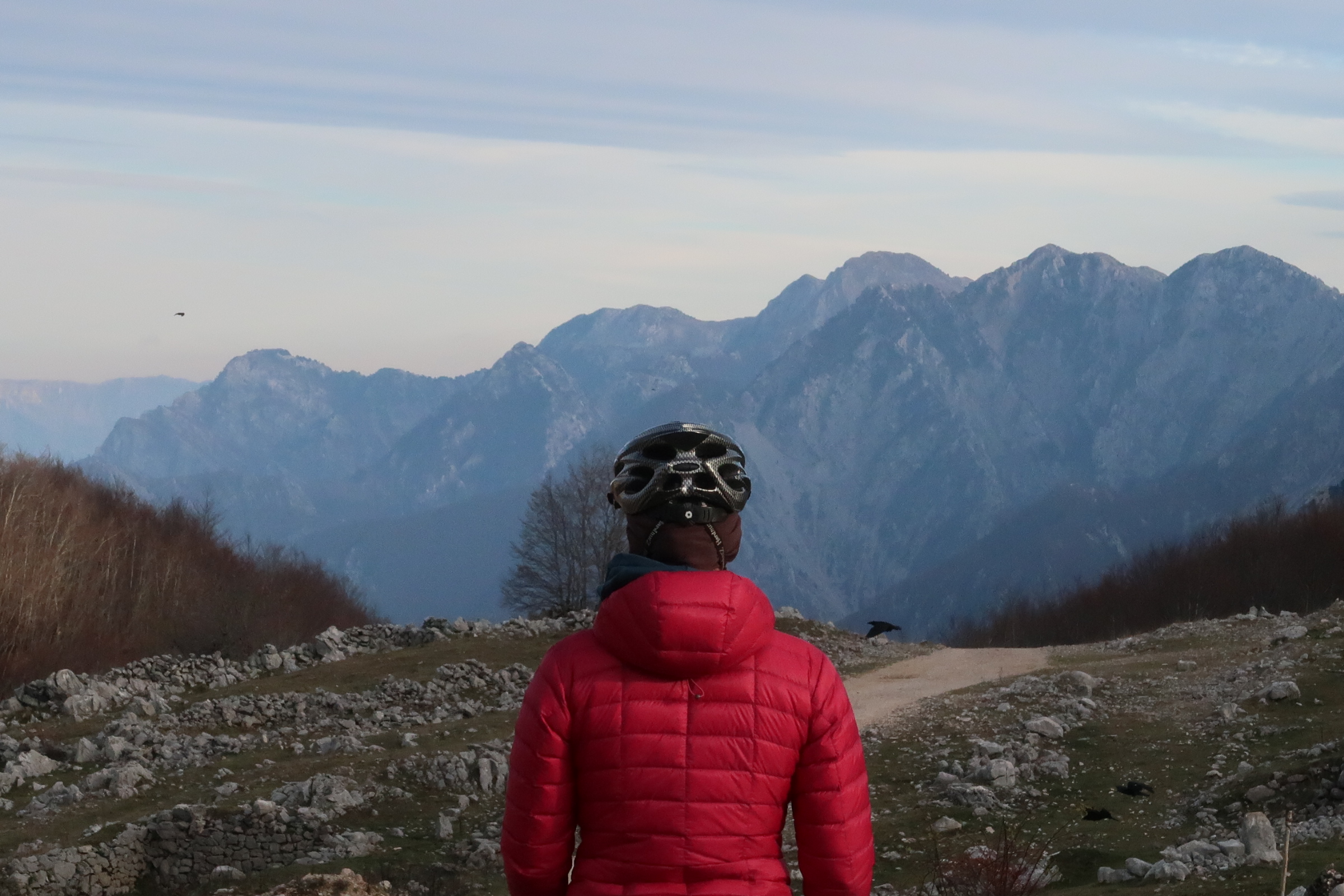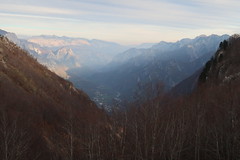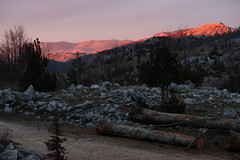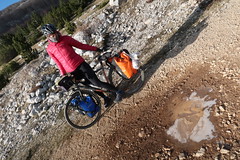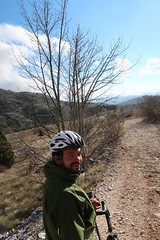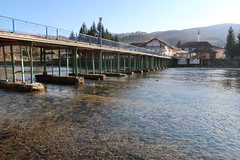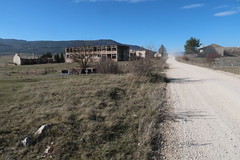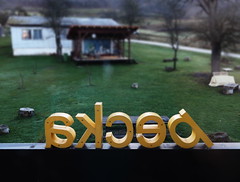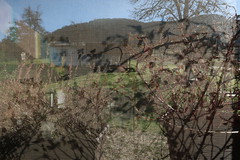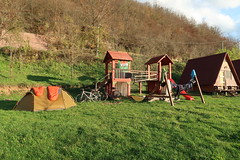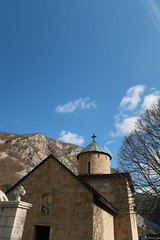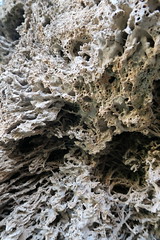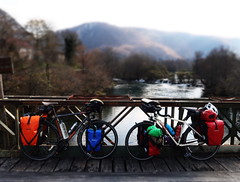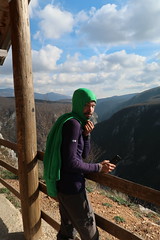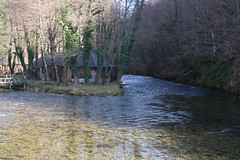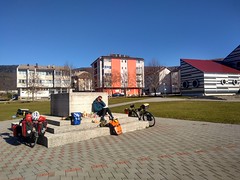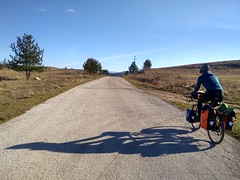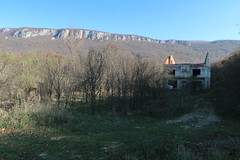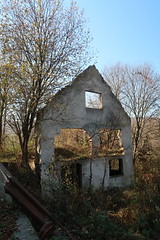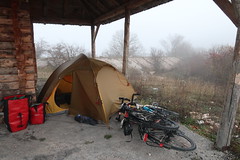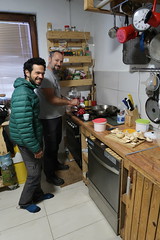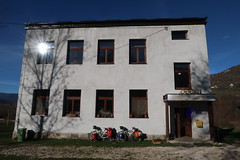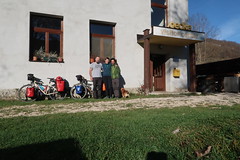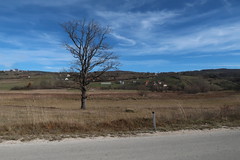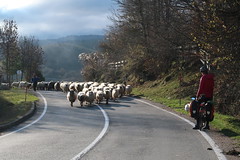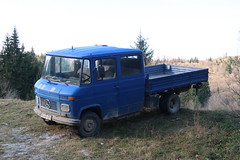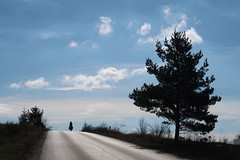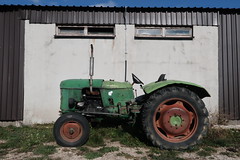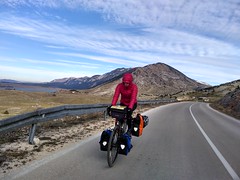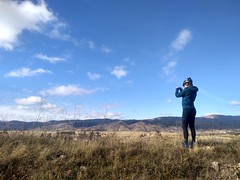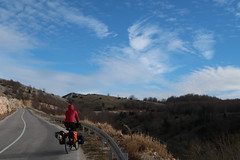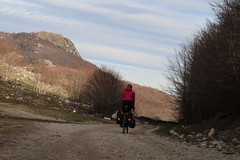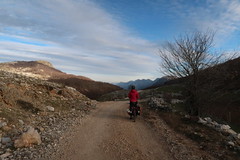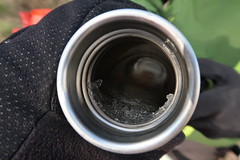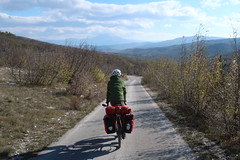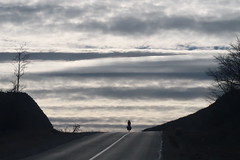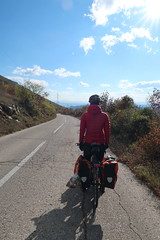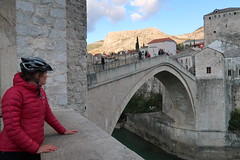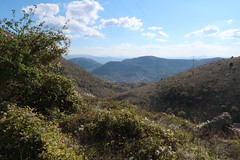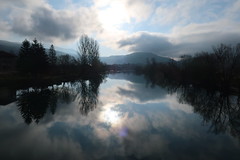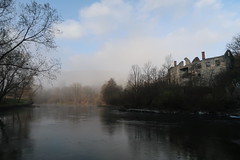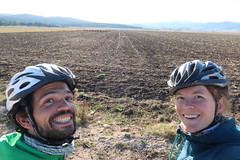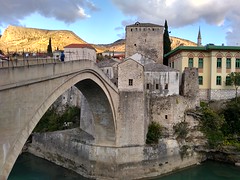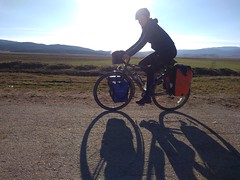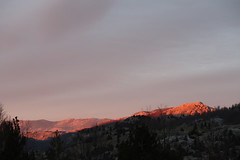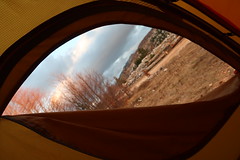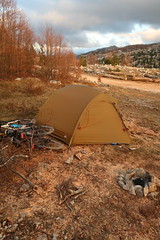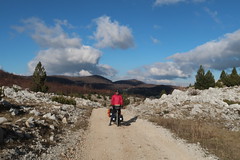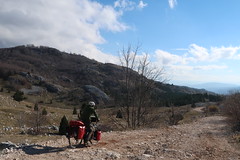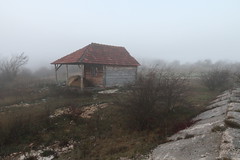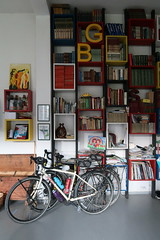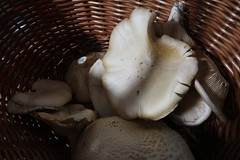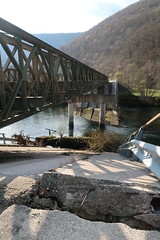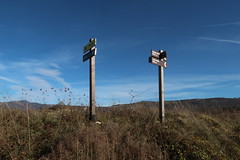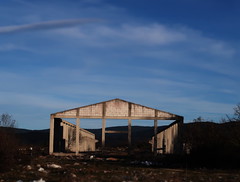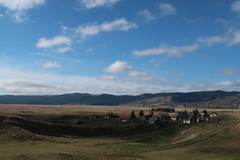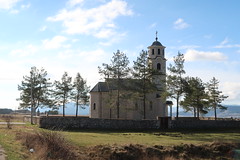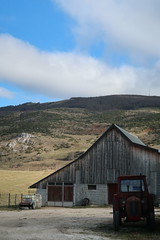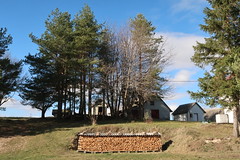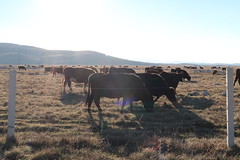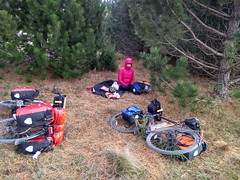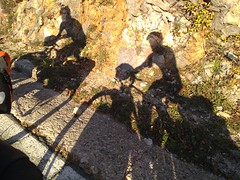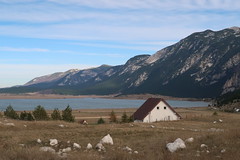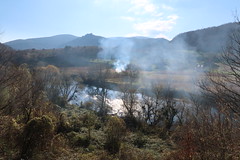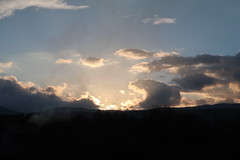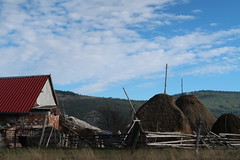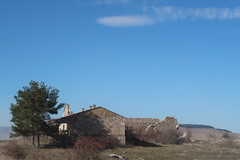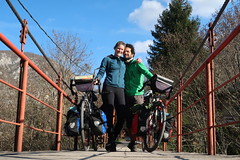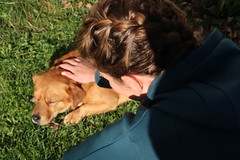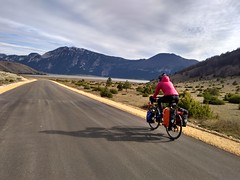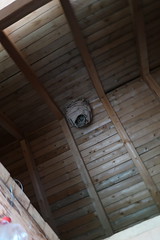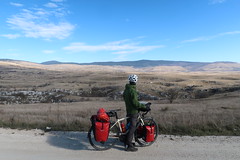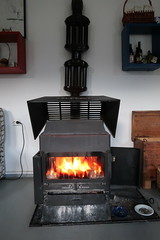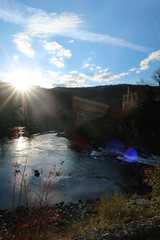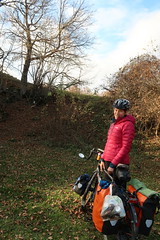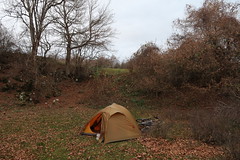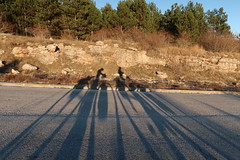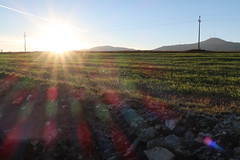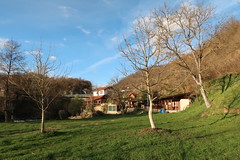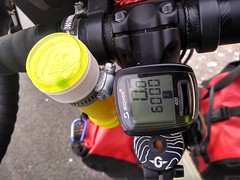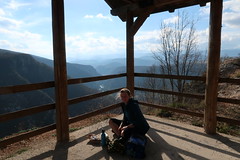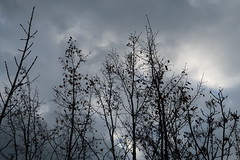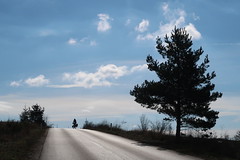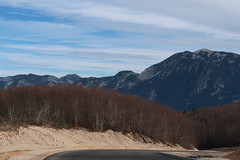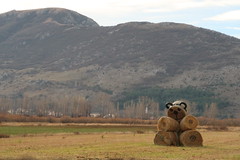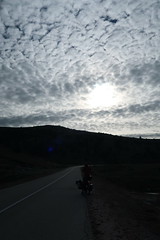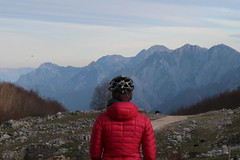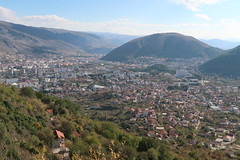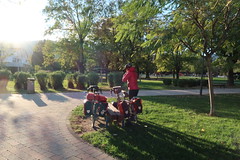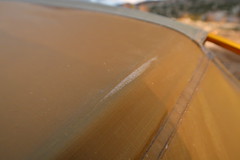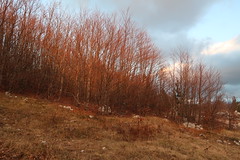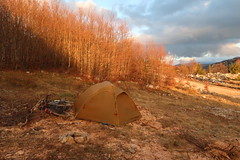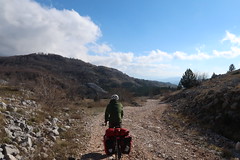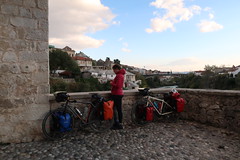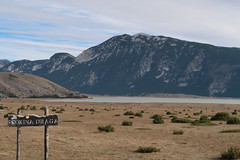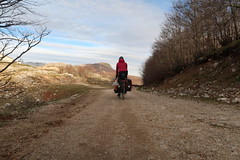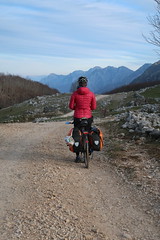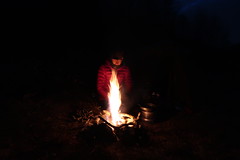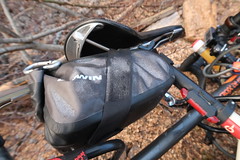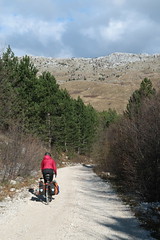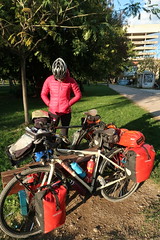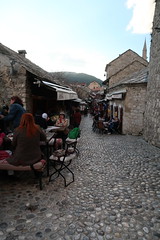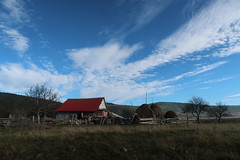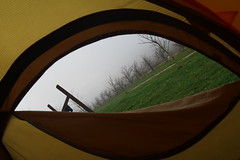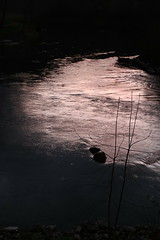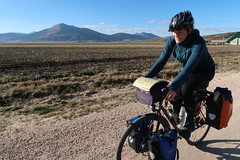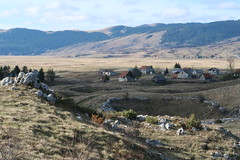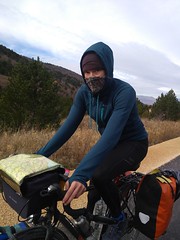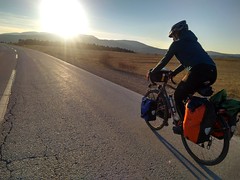Our typical camp finding tactics would have to change, in these regions in particular. Rather than nestling ourselves inside a patch of forest, we called on the kindness of strangers to suggest safe places to camp or to allow us pitch our tent on their land. In our experience so far, no-one has ever said no. The added bonus of this approach is that we meet more people and have much more interesting conversations than we would have had otherwise, between just the two of us in our tent!
We crossed the border into BiH just as the sun was setting, generally not the best time of day to assess a new region let alone a new country. We found ourselves in a town called Ripac, looking for a place to camp. We approached a man in his early fifties, an amputee, who was standing outside his house. Not having any languages in common, he called his neighbour Dino to come and help with communication. With the help of my rusty German, we were told that the closest campsite was closed but, after some discussion, we were invited to pitch our tent in Dino’s back garden.
It was only in the morning, that we learnt that Dino’s German was so good because he was a doctor in a hospital in Zagreb. His house was certainly in a much better state of repair than others in the village, and his back garden had quite spectacular views of the river which ran through it.
We headed towards the region of Martin Brod – famous for it’s waterfalls. We were looking for a campsite to stop at for a couple of nights, however most campsites were closed since most (sane) people don’t go camping in November. After coming across several shut gates, we finally found an open gate and rolled our bikes inside. It took us some hours to be sure that the place was actually open as we were the solitary guests – but we took the presence of a dog, several resident cats and a wifi signal as enough evidence that someone would appear soon.
Sure enough they did and we had our first rather entertaining ‘conversation’ through Google translate with the owner as he introduced us to the traditional Balkan rakija.
We spent our few days off plotting our onwards route and making the most of staying in one place so that our tent could finally dry out in the sunshine. It had been in a permanent state of dampness for the previous two weeks (see rainy Slovenia), and we were starting to see mould growing in the corners. In the middle of the day the sun was the warmest we had felt in weeks – forcing us to actually find shelter in the shade -, whereas at night the temperatures plummeted. The owners invited us to come inside and warm up in their bar. It was however a mixed blessing : warmth vs intoxication by cigarette smoke.
Route planned and tent dry, we went off exploring country #10. Our first few days in Bosnia took us through some beautifully sparse landscapes. Our typical route selection took us on a quiet roads in varying states of repair: sometimes surfaced, sometimes not, often changing multiple times along the same stretch.
Mentally, the risk of landmines took some getting used to. It was hard to imagine living in a country where you were not free to explore the mountains and forests at will, for risks of what you might find. Initially, it was hard to not be a bit paranoid of stepping a foot off the asphalt (queue peeing in more open places than one might otherwise…). Eventually we learnt to be more relaxed in areas which were marked as clear on our map, or in regions where humans had clearly been recently or where animals were grazing (queue camping amongst sheep poo and in wooden shelters). Our relaxed chatter would then be abruptly silenced when one or other of us saw a sign on the road warning of landmines in the area, and inevitably the cycle would return to stage one and repeat several times over until we reached Montenegro.
Late one afternoon Pedro got puncture #2 of the trip. Having failed to find the hole, we replaced the inner tube. We wanted to reach the next town before the end of the day as we were out of water, food stocks were running low and we still hadn’t been able to find any alcohol for our stove. We rolled down the 20km to Donji Baraci and considered our options in the forecourt of the petrol station. (I would not have guessed before we left, but in the Balkans, petrol stations were excellent places to hang out: they have toilets, running water and often WiFi too, every cyclo tourers dream).
There was a campsite marked on openstreetmaps 6km away. We weren’t really sure if it was open or even if it actually existed, but despite this and the fact that it was already getting dark we decided to make a dash for it. At the turning from the main road however, we saw signs for the Pecka Visitor Center and wondered what it was.
Further down the road towards our potential campsite, the road split in two. The camping place was 5km away, uphill and the visitor center 2 km away, downhill. With tired legs and fading light, we made the easy decision of sliding down to the visitor center. Although we weren’t sure if we could camp there, we figured we’d work something out.
Moments later, after we’d pedalled just 50m from the decision making split in the road, a car slowed down as it passed us. Inside the car was Boro, the guy who ran the visitor center. He warmly welcomed us to pitch our tent there. Warning us to cycle slowly as there were big dogs on the way down, he waved us farewell. True to his word, we were soon greeted by the deep murderous barking of dogs. We wheeled past them slowly and found ourselves at the visitor centre saying hello again to the familiar face of Boro.
He began by inviting us to pitch our tent anywhere infront of the visitor centre before upgrading that already kind offer to an invitation to sleep inside, in a bed. Our eyes lit up!
Since Slovenia, the smell of woodsmoke in the late afternoon had become a familiar scent and it had often left us craving to sit in front of one. Finally our dreams came true. We wheeled ourselves and our bikes inside, past a giant basket of hand-picked mushrooms, and into a toasty warm room with a wood stove roaring. There was even a record player.
Over some delicious grape rakija, Boro explained that the building used to be a school. The Peska valley used to be home to a few thousand people and now only 100 or so lived there. In 2014 renovations began to turn the building into a multi-use space: for the local community, for group activities and workshops and to promote the tourism possibilities in the region. As Boro tells us, there have been workshops on mushroom picking, yoga, macrobiotic cooking, and group trips exploring the plentiful rock climbing, cycling and hiking possibilities in the region.
It evolved that Boro was a mushroom picking expert and the unusually warm winter had extended the harvesting period. This worked in our favour, as we got to cook dinner with these super tasty fungi. After a few more rotations of the record player and a few more rounds of rakija, we headed up to sleep in a corner of the 16 bed bunkroom – passing out as soon as our heads hit the pillow.
After a lesson in how to make Bosnian coffee and with bellies full of eggs and more mushrooms, we bid our farewells, with invitations to Boro to come and visit Portugal once we were back.
With some new scribbles of local knowledge on our map, our route through BiH was now significantly different to the one we had planned out a few days previously. We find this is often the case, but despite knowing that our route ideas will change, possibly daily, possibly hourly, somehow we still can’t help but make a plan in the first place. Plans are made to be broken afterall.
As we had already discovered many of the roads in BiH are unsurfaced, however over the next few days on our way to Mostar we would be reminded that not all unsurfaced roads are created equal. Some unsurfaced roads are compacted earth and gravel and very much passable by touring bike, while other unsurfaced roads are covered in loose stones and rocks and boulders and although fun to ride on a mountain bike, are a quite exhausting when on a bike weighing upwards of 40kg. All unsurfaced roads appear as the same innocuous white roads on our map, or maybe even yellow… and thus you have no idea what type of quiet little road you might be pedalling on and whether it will take you 30 minutes or 2.5 hours to cover 10km until you get there. All part of the adventure.
After a night camping in a sheep field (if it’s good enough for the sheep, it’s good enough for us) and a windy day of cycling, we found ourselves on one of these unsurfaced roads. The kind more suited to a mountain bike. Shortly after turning on to the road, we weighed up our options: either we could cycle 90km on the main surfaced road to Mostar, or we could stick to our unsurfaced road of questionable quality for 30km to Mostar. Both might take us the same amount of time. Adventurous (or fools) as we are, we went for the one of questionable quality of course.
As we slowly bumped our way further along the track, after passing a solitary farm all signs of civilisation disappeared. Just us and the track and an ominously circling murder of crows.
The light began to fade and we had no choice but to look for a place to camp. There was no handy sheep field to camp tonight, but there was a patch of land where some trees had recently been felled which gave us enough peace of mind that the land was safe to camp on. We pitched our tent in the encroaching darkness on top of a bed of sawdust only 5m from the track, but the place was so deserted and the track in such bad condition we barely expected anyone to pass in a vehicle.
The silence of our surroundings was amazing. Other than the crows we had barely seen any other creature along the track, let alone a human. The mountains and the stars were just for us.
We built a fire to keep us warm as we cooked our dinner on fuel of such low alcohol content, it would barely light in the cold. As we climbed into our tent, ice crystals were already forming on the flysheet and when we woke our water bottles were frozen. Winter was here.
It was a slow start the next morning, as we tried to convince ourselves to climb out of our sleeping bag cocoons. Finally on our way, in the morning light as opposed to the sunset, we began to enjoy our little off-road adventure far more than we had the night before. With a whole day ahead of us we knew we could make it to Mostar even if we had to walk all remaining 28km. We settled into mountain biking mode and slowly picked our way over the rocks testing our brakes and our ability to cycle up steep slopes on loose gravel. Feelings were mixed when we finally popped back out onto a tarmac road – a little bit sad that the mountain-biking was over, but our bodies relieved that they could finally relax and roll freely.
From a morning of solitude and frozen water bottles, we zoomed down the hill into the cosmopolitan chaos of the city of Mostar, finding ourselves melting in the sunshine and making a hunt for ice-cream.
.
.
.
.
.
A very cool charity helping to clear the land-mines in Bosnia and Herzegovnia and elsewhere are MAG international. Check them out!
